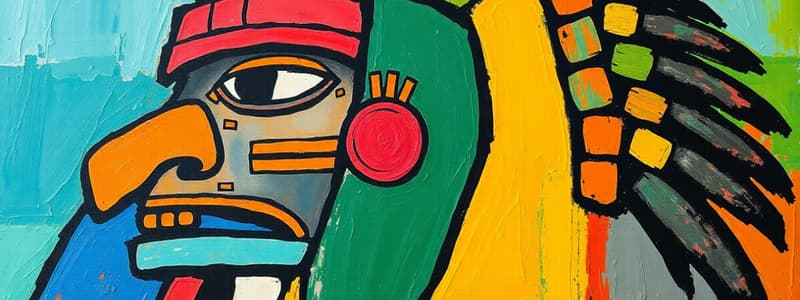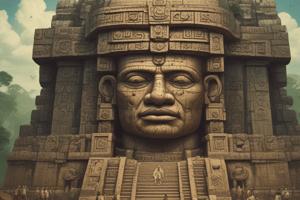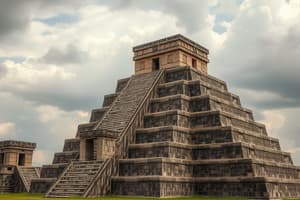Podcast
Questions and Answers
Which statement accurately describes the government structure of the Olmecs?
Which statement accurately describes the government structure of the Olmecs?
- A democratic system with representatives elected by the populace.
- A theocratic government where religious leaders held significant power. (correct)
- An oligarchy controlled by wealthy landowners.
- The government was a monarchy led by a single ruler.
What was a key feature of the Olmec religion?
What was a key feature of the Olmec religion?
- Worship of jaguar gods and practices of shamanism. (correct)
- Worship of multiple deities with no central figure.
- Strict monotheism centered around a sun god.
- Belief in an afterlife focused on reincarnation.
Which of the following accurately describes the economic activities of Cuicuilco?
Which of the following accurately describes the economic activities of Cuicuilco?
- Primarily focused on maritime trade and fishing.
- Primarily agricultural with trade in ceramics and obsidian. (correct)
- Focused on metalworking and trade with distant civilizations.
- Based on itinerant herding and hunting.
What was one of the significant architectural contributions of the Olmecs?
What was one of the significant architectural contributions of the Olmecs?
Which aspect of daily life distinguished the Olmecs from other Mesoamerican cultures?
Which aspect of daily life distinguished the Olmecs from other Mesoamerican cultures?
What geographical feature significantly influenced the culture of the Olmecs?
What geographical feature significantly influenced the culture of the Olmecs?
What distinguishes the civilization of Cuicuilco from the Olmecs?
What distinguishes the civilization of Cuicuilco from the Olmecs?
What key societal structure characterized the Olmecs?
What key societal structure characterized the Olmecs?
Which feature is NOT associated with the Maya civilization?
Which feature is NOT associated with the Maya civilization?
What were the primary agricultural products cultivated by the Maya?
What were the primary agricultural products cultivated by the Maya?
Which city served as the political and religious center for the Zapotec civilization?
Which city served as the political and religious center for the Zapotec civilization?
What was a significant mathematical concept developed by the Maya?
What was a significant mathematical concept developed by the Maya?
Which god was specifically worshiped by the Maya as the rain god?
Which god was specifically worshiped by the Maya as the rain god?
What type of social structure did the Zapotecs have?
What type of social structure did the Zapotecs have?
Which of the following is NOT a city of the Maya civilization?
Which of the following is NOT a city of the Maya civilization?
What was a notable contribution of the Zapotecs in terms of writing?
What was a notable contribution of the Zapotecs in terms of writing?
What was the main focus of the Toltec society?
What was the main focus of the Toltec society?
Which economic activity was NOT central to the Aztec economy?
Which economic activity was NOT central to the Aztec economy?
What significant architectural feature is associated with the Toltecs?
What significant architectural feature is associated with the Toltecs?
Who was considered the leader in the Aztec societal structure?
Who was considered the leader in the Aztec societal structure?
Which deity was primarily worshiped by the Toltecs?
Which deity was primarily worshiped by the Toltecs?
What were chinampas primarily used for in Aztec agriculture?
What were chinampas primarily used for in Aztec agriculture?
Which cultural aspect distinguished the daily life of the Aztecs?
Which cultural aspect distinguished the daily life of the Aztecs?
Where was the capital of the Aztec Empire located?
Where was the capital of the Aztec Empire located?
What was a key aspect of Teotihuacan's government structure?
What was a key aspect of Teotihuacan's government structure?
Which of the following deities was worshiped by the Teotihuacanos?
Which of the following deities was worshiped by the Teotihuacanos?
What was the primary economic activity of the Totonacs?
What was the primary economic activity of the Totonacs?
Which architectural feature is prominently associated with the Totonacs?
Which architectural feature is prominently associated with the Totonacs?
What was a significant cultural ritual practiced by the Totonacs?
What was a significant cultural ritual practiced by the Totonacs?
Which of the following was a prominent contribution of the Zapotecs?
Which of the following was a prominent contribution of the Zapotecs?
In which geographical area did the Teotihuacanos primarily establish their city?
In which geographical area did the Teotihuacanos primarily establish their city?
Which economic activity was NOT a primary focus of Teotihuacan?
Which economic activity was NOT a primary focus of Teotihuacan?
Flashcards are hidden until you start studying
Study Notes
Olmecs
-
The Olmecs were an ancient civilization who developed in the tropical lowlands of the Gulf Coast of Mexico, primarily in Veracruz and Tabasco.
-
They had a theocratic government, where religious leaders held major power.
-
Their economy was based on farming (maize) and extensive trade of jade, obsidian, and ceramics throughout Mesoamerica.
-
They built colossal stone heads and ceremonial centers like San Lorenzo and La Venta, leading to the development of planned cities.
-
The Olmecs believed in jaguar gods and practiced shamanism.
-
They were responsible for the first pyramids, calendar systems, and potentially the early development of writing in Mesoamerica.
Cuicuilco
-
Cuicuilco was located near modern-day Mexico City.
-
The government was centralized, possibly a chiefdom or theocracy, with religious rulers overseeing agriculture and urban planning.
-
They primarily farmed and traded with nearby regions, particularly for ceramics and obsidian.
-
They built one of the earliest known circular pyramids in Mesoamerica.
-
The city was buried by volcanic activity from Xitle.
Maya
-
The Maya civilization was located in the Yucatan Peninsula, southern Mexico, Guatemala, Belize, parts of Honduras, and El Salvador.
-
The Maya had a decentralized system with city-states ruled by kings (Ajaw).
-
Their economy was based on agriculture (maize, beans, squash) and extensive trade of cacao, jade, obsidian, and textiles.
-
They built impressive, towering pyramids, palaces, and ball courts.
-
The Mayans were polytheistic, worshiping nature gods, and practiced human sacrifices.
-
Mayan life revolved around agriculture, religion, astronomy, writing, calendar systems, mathematics, and art.
Zapotecs
-
The Zapotecs were located in Oaxaca in southern Mexico.
-
They had a hierarchical society ruled by kings and nobles.
-
Their capital, Monte Albán, served as a political and religious center.
-
They primarily farmed and traded, specializing in ceramics, textiles, and obsidian.
-
Monte Albán was one of the first planned cities in Mesoamerica and featured massive stone platforms, plazas, and tombs.
-
They believed in multiple deities and practiced elaborate funerary rituals.
-
They developed a writing system and calendar.
Teotihuacan
-
The Teotihuacan civilization was located in the northeastern Valley of Mexico.
-
They had a centralized and likely theocratic government.
-
They were highly reliant on trade, particularly for obsidian, which they used for tools and weapons.
-
They built grand pyramids, such as the Pyramid of the Sun and Pyramid of the Moon, and a well-planned urban grid.
-
The Teotihuacanos worshipped gods like Tlaloc and Quetzalcoatl, and practiced human sacrifice.
-
They lived in apartment complexes, were skilled artisans, and created murals, pottery, and obsidian tools.
Totonacs
-
The Totonac people lived in the coastal regions of Veracruz and Puebla.
-
They had city-states, each ruled by a chief or ruler. The most important city was El Tajín.
-
Their economy depended on agriculture (vanilla and maize), pottery, and textiles.
-
They built distinct pyramids, such as the Pyramid of the Niches at El Tajín.
-
They were polytheistic and practiced human sacrifices, worshiping gods like Tajín, the god of thunder and lightning.
-
They were known for their art and dance rituals, especially the Voladores (pole flying) ceremony.
Toltecs
-
The Toltecs were based in Tula in central Mexico.
-
They had a militaristic society governed by warrior-priests and a structured society, emphasizing warfare and religion.
-
Their economy relied on agriculture and obsidian trade.
-
They are known for the Atlantean statues in Tula, which depict warriors.
-
They worshipped Quetzalcoatl and other gods associated with warfare and the sun, and practiced human sacrifice.
-
The Toltecs were skilled warrior and artisans, known for their pottery and sculptures.
Aztecs (Mexicas)
-
The Aztecs built their empire in the Valley of Mexico, with the capital of Tenochtitlan.
-
The Aztec government was led by an emperor (Tlatoani) and had a hierarchical society.
-
Their economy was based on agriculture (chinampas), tribute from conquered territories, and trade.
-
They built impressive cities, especially Tenochtitlan, with stunning temples, marketplaces, and palaces.
-
The Aztecs worshipped gods like Huitzilopochtli and Tlaloc, and practiced human sacrifice.
-
Aztec life centered around farming, warfare, religion, rituals, arts, and poetry.
Chichimecas
- The Chichimecas were nomadic and semi-nomadic groups that inhabited Northern Mexico.
Studying That Suits You
Use AI to generate personalized quizzes and flashcards to suit your learning preferences.




